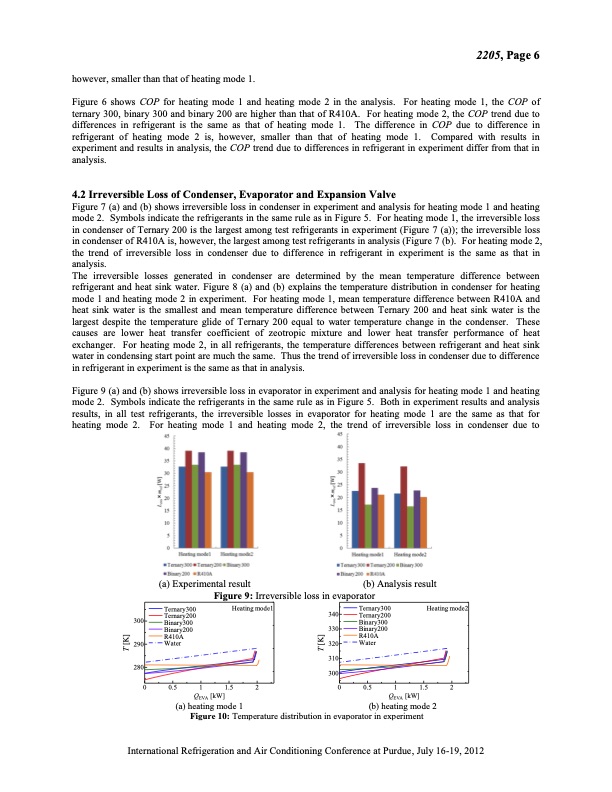
PDF Publication Title:
Text from PDF Page: 007
however, smaller than that of heating mode 1. Figure 6 shows COP for heating mode 1 and heating mode 2 in the analysis. For heating mode 1, the COP of ternary 300, binary 300 and binary 200 are higher than that of R410A. For heating mode 2, the COP trend due to differences in refrigerant is the same as that of heating mode 1. The difference in COP due to difference in refrigerant of heating mode 2 is, however, smaller than that of heating mode 1. Compared with results in experiment and results in analysis, the COP trend due to differences in refrigerant in experiment differ from that in analysis. 4.2 Irreversible Loss of Condenser, Evaporator and Expansion Valve Figure 7 (a) and (b) shows irreversible loss in condenser in experiment and analysis for heating mode 1 and heating mode 2. Symbols indicate the refrigerants in the same rule as in Figure 5. For heating mode 1, the irreversible loss in condenser of Ternary 200 is the largest among test refrigerants in experiment (Figure 7 (a)); the irreversible loss in condenser of R410A is, however, the largest among test refrigerants in analysis (Figure 7 (b). For heating mode 2, the trend of irreversible loss in condenser due to difference in refrigerant in experiment is the same as that in analysis. The irreversible losses generated in condenser are determined by the mean temperature difference between refrigerant and heat sink water. Figure 8 (a) and (b) explains the temperature distribution in condenser for heating mode 1 and heating mode 2 in experiment. For heating mode 1, mean temperature difference between R410A and heat sink water is the smallest and mean temperature difference between Ternary 200 and heat sink water is the largest despite the temperature glide of Ternary 200 equal to water temperature change in the condenser. These causes are lower heat transfer coefficient of zeotropic mixture and lower heat transfer performance of heat exchanger. For heating mode 2, in all refrigerants, the temperature differences between refrigerant and heat sink water in condensing start point are much the same. Thus the trend of irreversible loss in condenser due to difference in refrigerant in experiment is the same as that in analysis. Figure 9 (a) and (b) shows irreversible loss in evaporator in experiment and analysis for heating mode 1 and heating mode 2. Symbols indicate the refrigerants in the same rule as in Figure 5. Both in experiment results and analysis results, in all test refrigerants, the irreversible losses in evaporator for heating mode 1 are the same as that for heating mode 2. For heating mode 1 and heating mode 2, the trend of irreversible loss in condenser due to 2205, Page 6 (a) Experimental result (b) Analysis result Figure 9: Irreversible loss in evaporator Ternary300 Ternary200 Binary300 Binary200 R410A Water Heating mode1 300 290 280 0 0.5 1 1.5 2 QEVA [kW] (a) heating mode 1 340 330 320 310 300 0 0.5 1 1.5 2 QEVA [kW] (b) heating mode 2 Figure 10: Temperature distribution in evaporator in experiment Ternary300 Ternary200 Binary300 Binary200 R410A Water Heating mode2 International Refrigeration and Air Conditioning Conference at Purdue, July 16-19, 2012 T [K] T [K]PDF Image | Experimental Assessment on Performance of a Heat Pump Cycle

PDF Search Title:
Experimental Assessment on Performance of a Heat Pump CycleOriginal File Name Searched:
heat-pump-cycle-analysis.pdfDIY PDF Search: Google It | Yahoo | Bing
CO2 Organic Rankine Cycle Experimenter Platform The supercritical CO2 phase change system is both a heat pump and organic rankine cycle which can be used for those purposes and as a supercritical extractor for advanced subcritical and supercritical extraction technology. Uses include producing nanoparticles, precious metal CO2 extraction, lithium battery recycling, and other applications... More Info
Heat Pumps CO2 ORC Heat Pump System Platform More Info
| CONTACT TEL: 608-238-6001 Email: greg@infinityturbine.com | RSS | AMP |